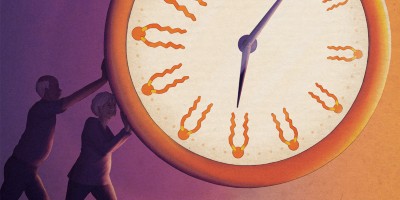Female fecundity decreases one to two decades before the menopausal transition. A study by Zhang et al. now identifies aging-related decline of the polyamine spermidine as a crucial bottleneck for oocyte quality. Supplementation with spermidine rejuvenates oocytes in vitro and in vivo, and leads to improved fertility of middle-aged female mice.

References
Aitken, R. J. Hum. Reprod. 37, 629–638 (2022).
Levine, H. et al. Hum. Reprod. Update 23, 646–659 (2017).
Zhang, Y. et al. Nat. Aging https://doi.org/10.1038/s43587-023-00498-8 (2023).
Eisenberg, T. et al. Nat. Cell Biol. 11, 1305–1314 (2009).
Bauer, M. A. et al. Cell Cycle 12, 346–352 (2013).
Yuan, X., Tian, G. G., Pei, X., Hu, X. & Wu, J. Cell Biosci. 11, 107 (2021).
Eisenberg, T. et al. Nat. Med. 22, 1428–1438 (2016).
Liu, L. et al. Reprod. Biomed. Online 44, 411–422 (2022).
Peters, A. E. et al. Front. Cell Dev. Biol. 9, 691826 (2021).
Jiang, D. et al. Int. J. Mol. Sci. 24, 5793 (2023).
Tao, Y. & Liu, X. J. Aging Cell 12, 42–49 (2013).
Mao, M. et al. Acta Pharmacol. Sin. 42, 361–369 (2021).
Zhang, H. et al. Mol. Cell 76, 110–125.e9 (2019).
Gokce, S., Herkiloglu, D., Cevik, O. & Turan, V. Reprod. Sci. 30, 569–575 (2023).
Jiang, D. et al. Theriogenology 168, 25–32 (2021).
Acknowledgements
F.M. is grateful to the Austrian Science Fund FWF (F3012, W1226, P29203, P29262, P27893, P31727, P37016) and the Austrian Federal Ministry of Education, Science and Research as well as the University of Graz for grants ‘Unkonventionelle Forschung-InterFast and Fast4Health’ and ‘flysleep’ (BMWFW-80.109/0001-WF/V/3b/2015). We acknowledge the support of the Field of Excellence BioHealth of NAWI Graz and the BioTechMed-Graz flagship project ‘EPIAge’.
Author information
Authors and Affiliations
Corresponding author
Ethics declarations
Competing interests
F.M. has equity interests and is advisor of The Longevity Labs (TLL) and has equity interest in in Samsara Therapeutics. A.Z. declares no conflict of interest.
Rights and permissions
About this article
Cite this article
Zimmermann, A., Madeo, F. Spermidine promotes fertility in aged female mice. Nat Aging 3, 1317–1319 (2023). https://doi.org/10.1038/s43587-023-00495-x
Published:
Issue Date:
DOI: https://doi.org/10.1038/s43587-023-00495-x
- Springer Nature America, Inc.


